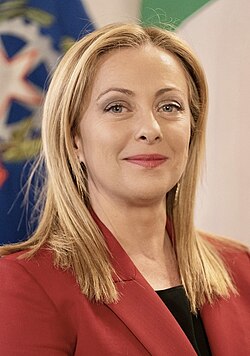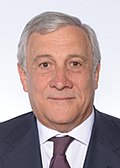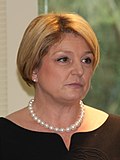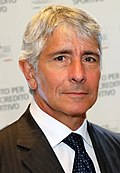Meloni government
68th and current government of the Italian Republic From Wikipedia, the free encyclopedia
The Meloni government is the 68th and current government of the Italian Republic, the first headed by Giorgia Meloni, leader of Brothers of Italy, who is also the first woman to hold the office of Prime Minister of Italy.[1][2][3] The government was sworn in on 22 October 2022.[4][5] It was one of the fastest government formations in the history of the Italian Republic.[6] It was variously described as a shift to the political right,[7] as well as the first far-right-led coalition in Italy since World War II.[8][9]
Meloni government | |
|---|---|
68th Cabinet of Italy | |
| Incumbent | |
 | |
| Date formed | 22 October 2022 |
| People and organisations | |
| Head of state | Sergio Mattarella |
| Head of government | Giorgia Meloni |
| Deputy head of government | Antonio Tajani Matteo Salvini |
| No. of ministers | 25 (incl. Prime Minister) |
| Ministers removed | 2 resigned |
| Member parties | |
| Status in legislature | Majority (coalition) Chamber of Deputies: 244 / 400 (61%)
Senate:120 / 205 (59%) |
| Opposition parties | |
| History | |
| Election | 2022 election |
| Legislature term | XIX Legislature (2022–present) |
| Incoming formation | 2022 government formation |
| Predecessor | Draghi government |
Supporting parties
| Party | Main ideology | Leader | ||
|---|---|---|---|---|
| Government parties | ||||
| Brothers of Italy (FdI) | National conservatism | Giorgia Meloni | ||
| League (Lega) | Right-wing populism | Matteo Salvini | ||
| Forza Italia (FI) | Liberal conservatism | Silvio Berlusconi (died on 12 June 2023) Antonio Tajani (since 15 July 2023) | ||
| Parties with secondary government positions | ||||
| Us Moderates (NM) | Liberal conservatism | Maurizio Lupi | ||
| External support | ||||
| Union of the Centre (UdC) | Christian democracy | Lorenzo Cesa | ||
| Coraggio Italia (CI) | Liberal conservatism | Luigi Brugnaro | ||
| Associative Movement of Italians Abroad (MAIE) | Italians abroad interests | Ricardo Merlo | ||
| Animalist Movement (MA) | Animal rights | Michela Vittoria Brambilla | ||
History
Summarize
Perspective
Government formation

Immediately after the first meeting of the Italian Parliament's new legislature, tensions began to grow within the centre-right coalition. On 13 October, Silvio Berlusconi refused to support Ignazio La Russa,[10] a politician with a neo-fascist background who was the Brothers of Italy (FdI) candidate to be President of the Senate of the Republic.[11][12][13] He succeeded in being elected by obtaining 116 votes out of 206 in the first round,[14] thanks to the support from opposition parties to the centre-right coalition.[15][16] Tensions further grew, in particular between Berlusconi and Giorgia Meloni, whom Berlusconi described as "patronising, overbearing, arrogant" and "offensive" in a series of written notes in the Senate.[17][18] In the following days, after meetings between parties' leader, tensions loosened and the centre-right coalition parties reached an agreement on the formation of the new cabinet.[1]

On 20 October, consultations between President Sergio Mattarella and parties officially began. On the following day, delegates from FdI, the League (Lega), whose member Lorenzo Fontana had been elected President of the Chamber of Deputies on 14 October),[19][20] Forza Italia (FI), and the group of Civics of Italy–Us Moderates–MAIE told Mattarella they had reached an agreement to form a coalition government with Meloni as Prime Minister.[2][21] In the afternoon, Mattarella summoned Meloni to the Quirinal Palace, asking her to form a new government.[3] Meloni accepted the task, and on the same day assembled a cabinet, which was officially sworn in on 22 October,[4][5][22] becoming the first woman to hold the office of Prime Minister of Italy.[7][8][9] The government successfully won the confidence vote, held in late October,[23][24] with a comfortable majority in both houses.[25][26][27]
On 25 October, Meloni gave her first official speech as Prime Minister in front of the Chamber of Deputies, before the confidence vote on her government. During her speech, she stressed the weight of being the first woman to serve as head of the Italian government.[28] Meloni thanked several Italian women, notably including Tina Anselmi, Samantha Cristoforetti, Grazia Deledda, Oriana Fallaci, Nilde Iotti, Rita Levi-Montalcini, and Maria Montessori, who she said, "with the boards of their own examples, built the ladder that today allows me to climb and break the heavy glass ceiling placed over our heads."[29][30] On 31 October, the government nominated its deputy ministers and undersecretaries.[31] Galeazzo Bignami, one of the chosen deputy ministers,[32][33] caused controversy and garnered international attention as a 2005 photo of him with a Nazi armband became public.[34][35]
Investiture vote
| House of Parliament | Vote | Parties | Votes |
|---|---|---|---|
| Chamber of Deputies (Voting: 389 of 400, Majority: 195) |
FdI, Lega, FI, CdI–NM–MAIE | 235 / 389 | |
| PD–IDP, M5S, A–IV, AVS, +E | 154 / 389 | ||
| Abstention | SVP, ScN, UV | 5 / 389 | |
| Senate of the Republic (Voting: 199 of 206, Majority: 98) |
FdI, Lega, FI, CdI–NM–MAIE | 115 / 199 | |
| PD–IDP, M5S, A–IV, AVS, +E, SVP[a] | 79 / 199 | ||
| Abstention | SVP, ScN | 5 / 199 | |
Domestic policies
This section needs to be updated. (March 2024) |
Meloni's government first decree law was related to the ergastolo ostativo,[38] the prison regime that excludes the perpetrators of violent crimes, in particular those related to the mafia and terrorism, from receiving benefits in prison unless they collaborate with the justice system, which are known as collaboratori di giustizia. In 2021, the Constitutional Court of Italy held that this was unconstitutional, and this decree law was previously approved in the Chamber on 31 March 2022 but did not make it to the Senate due to the snap elections.[39] One of the first measures implemented by the government regarded COVID-19 and concerned in the complete removal of the COVID-19 vaccination certificate, known in Italy as the Green Pass; moreover, the non-vaccinated doctors were re-integrated into service.[40][41] Another policy deemed of priority by the new right-wing government is raising the cash ceiling, which critics argue it favours tax evasion and unreported employment, while its proponents including Meloni reject this;[42] a poll by Izi showed that 6 out of 10 right-wing voters agreed that such a law would favour unreported employment.[43]
Decree on protests and rallies
On 31 October 2022, the government approved a decree providing for a penalty of up to six years of imprisonment for illegal parties and rallies.[44] This came amid anti-fascist protests at La Sapienza University,[45] which were subject of criticism due to the police's response,[46][47][48] and a rally in Predappio, where Benito Mussolini is buried, to commemorate the centenary of the March on Rome that led to the takeover of Mussolini and Italian fascism of the government.[49][50] Despite being officially presented as a decree against illegal rave parties,[51] the law was applicable to any gathering over 50 people that the public authority deemed dangerous,[52][53][54] which garnered criticism,[55][56][57] including from jurist Vitalba Azzolini.[58] The decree also caused protests from opposition parties and civil rights associations; according to Amnesty International, the decree "risked undermining the right to peaceful protest",[59] while Giuseppe Conte of the Five Star Movement compared it to a police state.[60] The law was also contested by FI,[61][62] which asked for changes,[63] including the reduction of sentences to four years,[64] while it was mainly supported by FdI and Lega,[65] and FdI's justice minister Carlo Nordio was reportedly upset by the law.[66]
Cultured meat ban
In March 2023, Italy's Meloni government approved a draft bill banning the production and commercialization of Cultured meat for human and animal consumption;[67][68][69] this move, which the government said was intended to protect food heritage.[70]
Italy became the first country to ban cultured meat in November 2023, when the government approved the bill.[71][72]
Foreign ban on surrogacys
On 16 October 2024, The Senate voted 84-58 in favor of extending a ban on surrogacy to couples who go abroad to avail of the procedure.[73]
Autonomy
On 23 January 2024, the bill about "differentiated autonomy" (which aims to give much more autonomy to Italian regions, for a maximum of 23 specific subjects) was approved in the Senate,[74] and it was then approved by the Chamber on June 19.[75] The law was criticized by the opposition and by various deputies and presidents of southern Italy (both from the majority and the opposition, such as Roberto Occhiuto of Forza Italia, president of Calabria, and Vincenzo De Luca of the PD, president of Campania),[76] accusing the government of wanting to abandon the southern regions, favoring those of the north, and on 20 July a collection of signatures began to call an abrogative referendum.[77][78][79]
Migration
On 24 January 2024, the Chamber of Deputies approves the ratification of the protocol of understanding with Albania, already approved by the Council of Ministers on 5 December and, even earlier, signed on 6 November, on the management of migration flows.[80] The ratification will then be approved by the Senate on February 15. [81]
On 22 May 2024, the Government, through Minister Matteo Piantedosi and in agreement with the Slovenian and Croatian authorities, implements a further six-month extension to the suspension of the Schengen Convention on the border with Slovenia, until 19 December;[82] The previous five-month extension had been approved on 18 January (and would have lasted until 19 June).[83]
Law and Order
On 15 June 2023, the Council of Ministers approves, on the proposal of Minister Nordio, a bill on justice (also known informally at first as the "Berlusconi reform" and then the "Nordio Bill"),[84] which abolishes the crime of abuse of office and redesigns the appeal procedures in the first instance initiated by prosecutors against acquittals, as well as the use and dissemination of wiretapping.[85] The bill will then be approved by the Senate on 13 February 2024,[86] and then by the Chamber of Deputies on 10 July.[87]
On 7 August, a change was also made to the crime of Undue Allocation of Money or Movable Property, implemented io replace the abolished abuse of office, together with some minor corrections, in order to allow the promulgation of the previous "Nordio Bill", which had remained suspended until then due to some perplexities of the Presidency of the Republic.[88]
On 18 September 2024, the Chamber of Deputies approves the "Safety Bill" (a modified version of the "safety package" previously approved by the Council of Ministers on 16 November 2023),[89] which regards many subjects: terrorism; scams; protection of law enforcement; banning cannabis (in any form, as well as hemp-containing products); imprisonment (2-7 years) for those who illegally occupy a property; increase in penalties in case of protest (including passive resistance to orders) in prison; the need for a residence permit (for non-EU immigrants) to buy a SIM card; possible imprisonment (1 month if alone, 6 months-2 years if with more people) for those who implement road or railway blockades (even as a protest).[90][91]
Minister of the Interior Matteo Piantedosi confirmed that the rule about blockades can be applied in some strike cases.[92] The bill was heavily criticized by the oppositions, which labelled it as "liberticidal": in particular, the "anti-Salis rule" (named after Ilaria Salis, an AVS MEP accused of illegal occupation in 2008; however, there was only one identification while she was in the plant at that moment, as the ALER has never initiated investigations, nor criminal or civil cases, in 16 years)[93] and the "anti-Gandhi rule" were criticized, the first one because it aggravates the situation of people who have no home to stay, the second one because it could also prevent peaceful protests (as Gandhi did).[94][95][96]
The Lega's request to evaluate the possibility of using chemical castration on those convicted of sexual violence was also accepted (this proposal was also highly criticized).[97]
The government has also proposed, within the security bill, the expansion of the powers of the secret services (which could participate in and/or direct terrorist or subversive groups), and the obligation for universities and public research bodies (Enti Pubblici di Ricerca) to collaborate with the secret services (DIS, AISE, AISI), including communicating private information; both of these proposals have been harshly criticized: the first because in Italy the secret services, during the Years of Lead between 1960s and 1980s, were involved in illicit activities and massacres during the Strategy of Tension,[98][99][100] and the second because it would represent an authoritarian turn on universities, with the risk of violating the privacy and communicating the political opinions of students, professors and researchers.[101][102][103][104]
On 4 April 2025, the government approved a decree-law (Decreto-legge) that almost entirely follows the previous security bill (apart from some changes), which had been sent back to the Chamber due to the lack of financial coverage and doubts raised by the President of the Republic Sergio Mattarella, in order to speed up the approval process.[105][106]
Party breakdown
Beginning of term
Ministers
10 | |
5 | |
5 | |
5 |
Ministers and other members
- Brothers of Italy (FdI): prime minister, 9 ministers, 4 deputy ministers, 14 undersecretaries
- League (Lega): 5 ministers, 2 deputy ministers, 9 undersecretaries
- Forza Italia (FI): 5 ministers, 2 deputy ministers, 6 undersecretaries
- Independents: 5 ministers, 1 undersecretary
- Us Moderates (NM): 1 undersecretary
- Renaissance (Rin): 1 undersecretary
Current
Ministers
10 | |
5 | |
5 | |
5 |
Ministers and other members
- Brothers of Italy (FdI): prime minister, 9 ministers, 4 deputy ministers, 13 undersecretaries
- League (Lega): 5 ministers, 2 deputy ministers, 9 undersecretaries
- Forza Italia (FI): 5 ministers, 2 deputy ministers, 6 undersecretaries
- Independents: 5 ministers, 1 undersecretary
- Us Moderates (NM): 1 undersecretary
Geographical breakdown

Beginning of term
- Northern Italy: 15 ministers
- Lombardy: 5 ministers
- Piedmont: 3 ministers
- Veneto: 3 ministers
- Emilia-Romagna: 2 ministers
- Friuli-Venezia Giulia: 1 minister
- Liguria: 1 minister
- Central Italy: 5 ministers (including PM)
- Lazio: 5 ministers (including PM)
- Southern and Insular Italy: 5 ministers
Current
- Northern Italy: 16 ministers
- Lombardy: 5 ministers
- Piedmont: 3 ministers
- Veneto: 3 ministers
- Emilia-Romagna: 3 ministers
- Friuli-Venezia Giulia: 1 minister
- Liguria: 1 minister
- Central Italy: 6 ministers (including PM)
- Lazio: 6 ministers (including PM)
- Southern and Insular Italy: 3 ministers
Council of Ministers
Composition
- Fitto resigned in order to become European Commissioner for Cohesion and Reforms in the Second Von der Leyen Commission.
References
Wikiwand - on
Seamless Wikipedia browsing. On steroids.





























